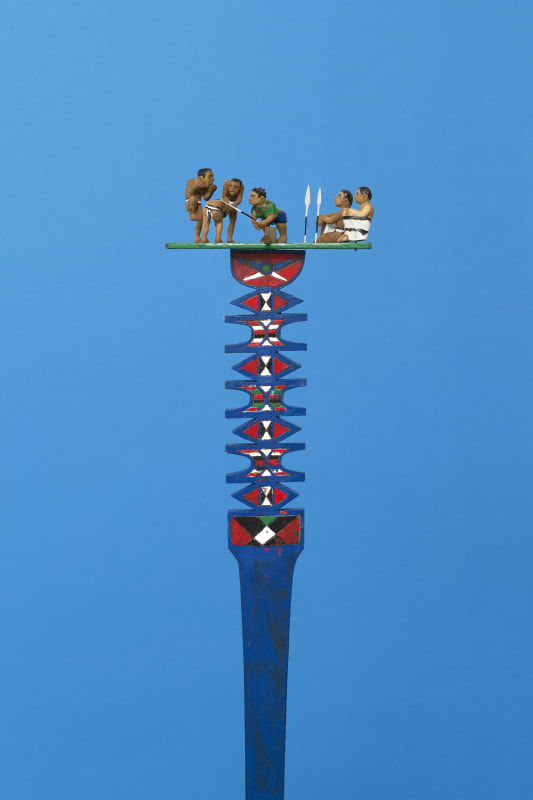C. 1925 - 2006, Androka, Mahafaly Land, Madagascar
Lived and worked in Androka, Madagascar
Working in Southwestern Madagascar, Efiaimbelo is deeply rooted in the Mahafaly culture of his ancestors. The origins of the art and funerary rites of Mahafaly society go back to the early sixteenth century when the royal Maroserana clans settled in Mahafaly country. Their traditional art funerary steles called aloalos that serve as grave markers at tomb sites is considered the most prestigious of the island, and has been transmitted from father to son, since the times of Soroboka, a forbear of Efiaimbelo's. Aloalos are planted in a square pattern around the three-dimensional rectangle of stones that makes up the tomb's superstructure. They represent particular memories of the deceased for whom the aloalo was erected, as well as reminders of a particular era.
Efiaimbelo both honors and extends the ritual of the aloalos. One of the first sculptors to have painted aloalos for decorative purposes only, Efiaimbelo has also introduced acrylic colours and new imagery into the genre. Typical of the traditional aloalos, Efiaimbelo creates carved posts of hardwood (Mendorave), roughly seven feet in height. Depending on the different interpretations of the Mahafalaly myths and legends, varying meanings are given to the conventional motifs which decorate the support as well as to the figures on the tableaux on top. The lower part can be described as a succession of stacked figure eights (the number for abundance and a symbol for the full moon), which are alternately abstract and geometrical. On top of the post is a more representational scene, usually a zebu and his herdsman. (The zebu, humped cattle, are a symbol of wealth; a child is similarly a sign of prosperity). As a result of his deep ties to a Westerner who is inducted as Avisoa (The Welcome One) by Soroboka (Efiaimbelo's forbear) into his Temaromainte clan, Efiaimbelo has modified the traditional tableaux: cattle thieves, bush-taxis, wrestlers, airplanes, motorcycles, tales of healing, fantastic legends, and personal anecdotes animate his repertory. Aloalos honour the dead, but also assert life. Through his sophistication and resourcefulness, Efiaimbelo has continued and developed this vital art.
